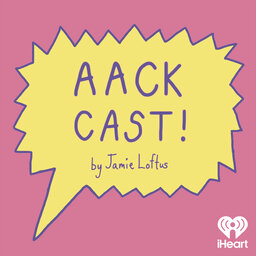Today, we hear what happened to Cathy at the height of the comic’s popularity in the late 1980s until now. Cathy Guisewite tells Jamie all!
Learn more about your ad-choices at https://www.iheartpodcastnetwork.com
In 1 playlist(s)
Aack Cast by Jamie Loftus
Aack! Cathy, the iconic and much-maligned comic strip by Cathy Guisewite, chronicled the day-to-day …Social links
Follow podcast
Recent clips

Aackt 8: Guisewite Shut
1:11:38

Aackt 7: 12 Artists
1:20:14

Aackt 6: Cathy and the Dreaded Mirror, Part 2
48:56
 Aack Cast by Jamie Loftus
Aack Cast by Jamie Loftus